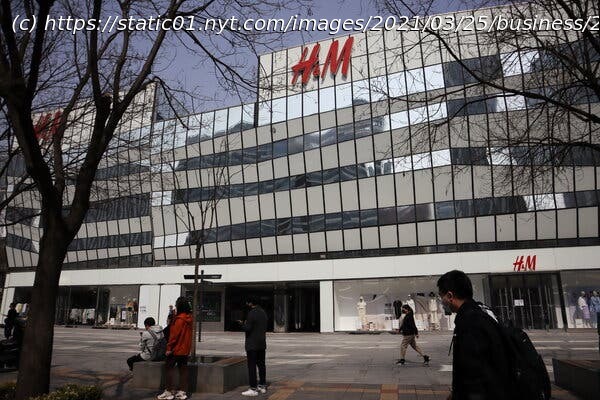Major clothing brands that rely on the Chinese market are caught in a bind as Beijing and the West harden their stances on the crackdown on Xinjiang.
H&M faces a boycott. Tommy Hilfiger, Adidas, Nike, Converse and Calvin Klein have lost their brand ambassadors. Burberry has had to give up an online video game partnership. Western brands are suddenly feeling the wrath of the Chinese consumer, the very shoppers who for years have clamored for their products and paid them vast amounts of money. Egged on by the ruling Communist Party, Chinese online activists are punishing foreign companies who have joined a call to avoid using cotton produced in the Chinese region of Xinjiang, where the authorities are waging a broad campaign of repression against ethnic minorities. The sudden bout of rage lays bare the vulnerability of foreign companies as tensions worsen between China and the United States and other countries. Lawmakers in the United States in particular who have been increasingly critical of China have pressured international companies to take a public stance on China’s human rights practices, including in Xinjiang. That makes the companies convenient targets for Chinese officials who are aggressively pushing back against American officials. “A lot of Western countries and China are pretty black-and-white on this issue. There’s not a lot of gray,” said Trey McArver, the co-founder of Trivium China, a consultancy that helps foreign businesses sell in China, referring to the opposing stances over Beijing’s policies in Xinjiang. “You can’t agree with both of them, so I don’t think it’s an easy answer.” China has not said as much, but its campaign against these brands came days after the United States and other Western countries imposed fresh sanctions on top Chinese officials earlier this week. These sought to punish Beijing for abuses against the Uyghurs and other minorities, which have been well documented by foreign media and rights groups. There is also growing evidence that cotton from Xinjiang is linked to coercive labor programs and mass internment of as many as one million Uyghurs, Kazakhs and other largely Muslim minorities, the United States government and rights groups say. It isn’t clear what the long-term impact might be on Western companies that depend on China to make or buy their products. On Thursday, there was still a steady stream of shoppers at several popular H&M and Nike outlets in Shanghai and Beijing. Previous state media-driven pressure campaigns against companies like Apple, Starbucks and Volkswagen ultimately failed to dent Chinese demand for their products. Still, their position could become increasingly precarious as Beijing looks for ways to counter the narrative. And it is no stranger to flexing its economic muscle for political ends.
Start
United States
USA — China Why Are China’s Consumers Threatening to Boycott H&M and Other Brands?






